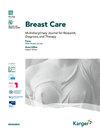Reimbursement in the context of precision oncology approaches in metastatic breast cancer: challenges and experiences
IF 2.1
4区 医学
Q2 OBSTETRICS & GYNECOLOGY
引用次数: 0
Abstract
Background: Precision oncology programs using Next Generation Sequencing (NGS) to detect predictive biomarkers are extending therapeutic options for patients with metastatic breast cancer (mBC). Regularly, based on the recommendations in the interdisciplinary molecular tumor board (iMTB), an inclusion in a clinical trial is not possible. In this case, the German health-insurance system allows for the application of reimbursement for an off-label drug use. Here we describe the current challenges and our experience with reimbursement of molecular therapies in mBC. Methods: A total of 100 applications for reimbursement of off-label therapies recommended by an iMTB were filed for patients with mBC, of which 89 were evaluable for this analysis. The approval rate was correlated with the molecular level of evidence of the respective therapy according to the NCT and ESCAT classification as well as with pretreatment therapy lines. Findings: Overall, 53.9% (48/89) of reimbursement applications were approved. Applications for therapies based on level of evidence m1 (NCT classification), tier I and II (ESCAT classification) had a significantly and clinically relevant increased chance of reimbursement, while a greater number of previous treatment lines had no significantly increased chance of approval, though a trend of approval towards higher treatment lines was detectable. Interpretation: Currently, the German jurisdiction seems to aggravate the clinical implementation of clinically urgently needed molecular therapies.转移性乳腺癌精确肿瘤学方法的报销:挑战和经验
背景:使用下一代测序(NGS)检测预测性生物标志物的精确肿瘤学项目正在扩大转移性乳腺癌(mBC)患者的治疗选择。通常,根据跨学科分子肿瘤委员会(iMTB)的建议,不可能将其纳入临床试验。在这种情况下,德国健康保险制度允许申请报销标签外药物的使用。在这里,我们描述了目前的挑战和我们的经验报销分子治疗在mBC。方法:共有100份iMTB推荐的超说明书治疗报销申请被提交给mBC患者,其中89份可用于本分析的评估。批准率与根据NCT和ESCAT分类的各自治疗的分子证据水平以及预处理治疗线相关。结果:总体而言,53.9%(48/89)的报销申请获得批准。基于证据水平m1 (NCT分类)、I级和II级(ESCAT分类)的治疗申请具有显著的临床相关的报销机会增加,而更多的先前治疗线的批准机会没有显著增加,尽管可以检测到向更高治疗线的批准趋势。解读:目前,德国的管辖权似乎加剧了临床实施临床急需的分子疗法。
本文章由计算机程序翻译,如有差异,请以英文原文为准。
求助全文
约1分钟内获得全文
求助全文
来源期刊

Breast Care
医学-妇产科学
CiteScore
4.40
自引率
4.80%
发文量
45
审稿时长
6-12 weeks
期刊介绍:
''Breast Care'' is a peer-reviewed scientific journal that covers all aspects of breast biology. Due to its interdisciplinary perspective, it encompasses articles on basic research, prevention, diagnosis, and treatment of malignant diseases of the breast. In addition to presenting current developments in clinical research, the scope of clinical practice is broadened by including articles on relevant legal, financial and economic issues.
 求助内容:
求助内容: 应助结果提醒方式:
应助结果提醒方式:


